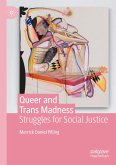This book challenges the perception of the psychiatric chart as a neutral and objective text. The chapters included in this book coalesce to reveal the psychiatric chart as a text that is, in fact, "storied" by institutional ideology that reflects, reinforces, reinterprets, and, at times, resists gendered, raced, sexualized, and classed norms, values, and presuppositions. Intersectional analysis highlights the nuanced ways in which dominant ideologies are activated in chart documentation to produce qualitatively specific psychiatric narratives of distress and related responses in the psychiatric institution. The book serves as a much-needed resource for mental health professionals, education and training programs, and researchers that meaningfully takes into account the social and structural materiality of people's lives and its impact on experiences of distress. It will also appeal to scholars investigating equity in health care across the fields of Critical Psychology, Disability Studies, Social Work, Allied Health, Mad Studies and Social Justice.
"The volume should be of interest to a readership concerned with interdisciplinarity and dialogue across academic and practitioner disciplinary boundaries. For the educators of mental health professionals, the chapters will be a useful resource ... ." (Isobel Moore and Philip John Archard, Journal of Social Work Practice, May 2, 2023)








